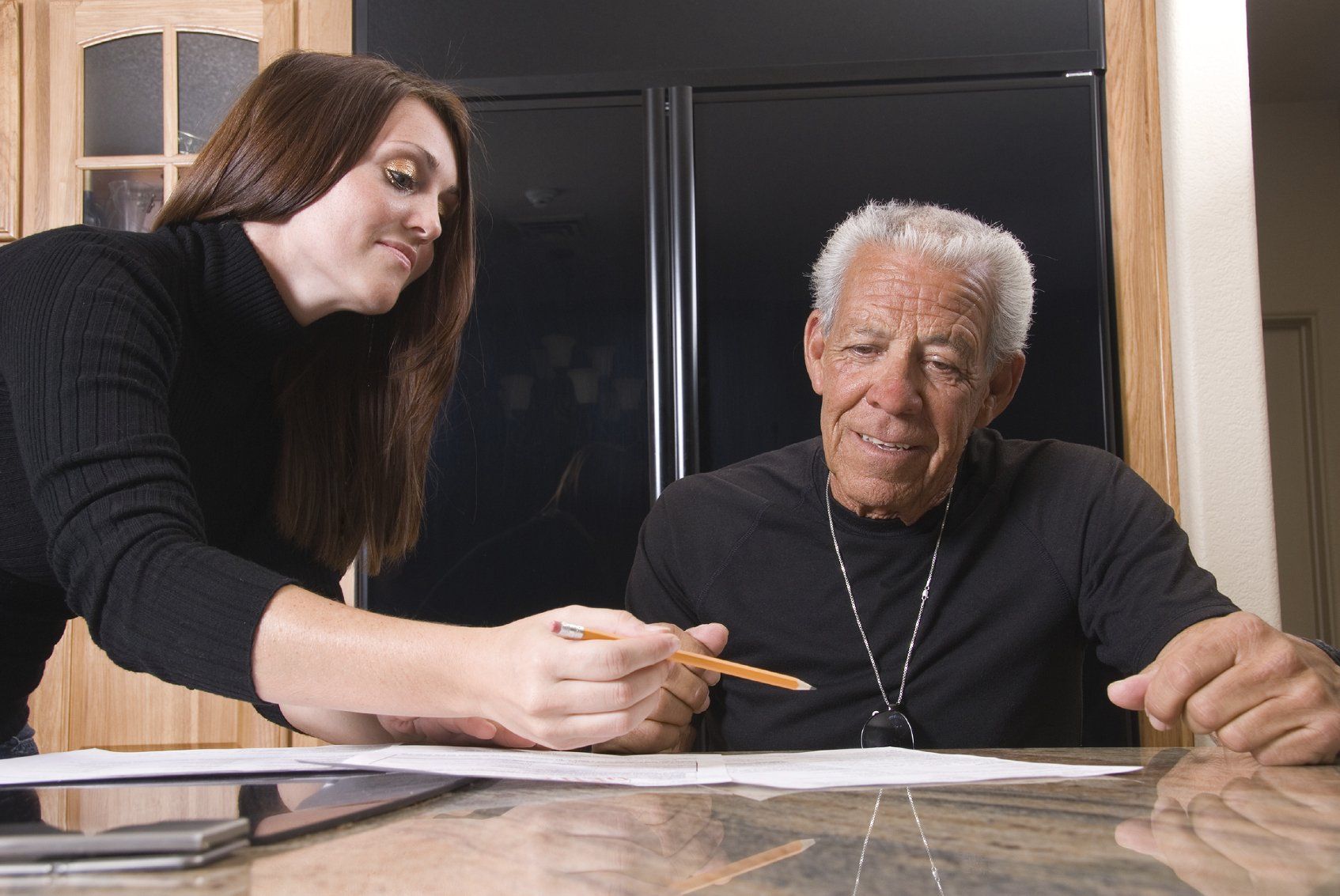The First-Time Homebuyer's 7 New Year's Resolutions
I love the new year! Starting fresh, getting ready for new opportunities, setting new goals for yourself and your life. There's something so liberating about it. You leave all your baggage behind in the new year with the decorations you take down and store for the next fall and winter. It's an opportunity to start your year off with a clear mind and with a path in sight for this new one. And if you're buying your first house this year, you already know that you're about to experience a whole new chapter of your life! This week, homes.com will be giving us some inspiration on the 7 New Year's resolutions every first-time homebuyer should be setting.
Perhaps the three most serious mistakes most first-time homebuyers make are failing to give themselves enough time to put together a down payment, failing to improve their credit and not paying down as much debt as possible before they start shopping for a home. These can take months to complete, and should they find their dream home, they won’t be in a position to make an offer or get a mortgage.
Many buyers also not give themselves enough time to make a budget for the purchase, including down payment and closing costs and a budget for monthly living expenses afterward to determine what they can reasonably afford. Before they can realistically house hunt, they will need to decide on a list of “must-haves” that includes location, find an excellent real estate agent and find a lender.
If 2020 is to be the year you want to become a homeowner, here are seven New Year’s resolutions that will help you not only buy your first home, but be able to do so comfortably and happily.
Resolution #1. Save for a Down Payment and Closing Costs
Unless you are a veteran who qualifies for a VA mortgage, which requires no down payment, you will need enough cash on hand for a down payment and closing costs. A recent survey found that nearly half of millennial renters who want to become homeowners have not saved a penny towards a down payment, even if you choose a 3% low down payment loan like those offered by Fannie Mae and Freddie Mac, you are going to need $6,000 for a down payment on a $200,000 home. Most young families will need six months or more to save that much. A few lenders offer “zero down” mortgages to first-time buyers, but only to borrowers with excellent credit.
Some first-time are turning to their families for gifts to get them over the down payment hump. These must be gifts, not loans. But lately, the “bank of mom and dad” has been drying up. In 2019, 17.4% of millennials were expecting support, down from 19.1% in 2018. Those who expect help in 2019 are expecting less ($8,928) than they did last year ($9,878).
If you haven’t started saving yet, reduce your living expenses as much as you can and put away as you can with every paycheck. Pay yourself first to make sure you are putting away enough to reach your goals. Don’t save cash by using your credit cards to pay living expenses. You will quickly increase your debt load, which will lower your credit rating. You will also increase your debt-to-income ratio, which could kill your chances of getting a mortgage. Even if you do get approved, you will be offered a higher interest rate.
Closing costs like title insurance, appraisal, settlement fee, home inspection, and lenders’ expenses are beyond your control and are required to be paid at settlement. Most closings these days take place six weeks or so after the seller accepts your offer. Closing costs are generally 5% of the home price, but they vary significantly by state. Here’s a state-by-state list of average closing costs in 2018.
Resolution #2. Reduce your Debt
Lenders look at debt-to-income ratios to see if you will have enough each month to handle a mortgage payment in addition to your monthly debt payments. Your debt-to-income ratio is the of all your monthly debt payments divided by your gross monthly income. The average debt-to-income ratio (DTI) for all recently approved mortgages is 24/37.
You can improve your DTI either by making more money or paying off some of your debt. Review your current debt load and pay off those that have the smallest balances.
Resolution #3. Improve Your Credit Rating.
Your credit score and credit history will also determine whether or not you will get a mortgage and how much interest you will pay. Lenders to whom you apply will pull your credit and carefully review your record. The average credit score for all mortgages is currently about 736.
Credit scores change every month, and you should monitor yours and review your credit history on each of the three major credit bureaus: TransUnion, Experian, and Equifax. If you need to improve your credit, then it should be at the top of your resolution list to do so– here are some tips on improving your credit. Like saving for a down payment and reducing your debt, it takes months to improve your credit. However, you can keep working on your credit until you find a house to buy and apply for a mortgage.
Resolution #4. Get Pre-approved by a Lender.
When you’ve done the best job on your credit and debt, ask a lender to pre-approve you before you to home shopping. With a pre-approval in hand, you will be in better shape to make an offer. If your credit or DTI continues to improve, you may be able to get a new pre-approval for a larger loan.
Resolution #5. Decide Where You Want to Live.
It’s no secret that first-time buyers are facing the worst affordability crisis in decades. Supplies of all homes improved slightly last year, but most economists don’t expect it to get much better and hotter markets may have even fewer homes than last year. Unfortunately, smaller starter homes popular with first-time buyers are harder to find than larger homes.
Inventories and prices vary greatly. Larger coastal metros are the most expensive, but properties in smaller cities are generally more affordable.
If you live in a high priced market, is relocating a possibility? Could you find an excellent job in your field or work virtually? If so, you might surf locations that appeal to you. Check out prices and the supply of affordable homes. You might be surprised at how much reasonable some markets are.
If relocating isn’t in the cards, try to enlarge the areas you would like to live in your current metro. The larger the area you consider, the more listings you will find. If you are moving from an urban rental to am exurb, you might a longer commute will make to become a homeowner faster than staying where you are,
Resolution #6. Make a Realistic Budget for Living in the Home You Buy.
Nearly two-thirds, 68%, of millennial homeowners said they had regrets about their home purchase, and 18% cited unexpected maintenance or hidden costs as their greatest pain point, a Bankrate survey found last year.
Your monthly mortgage is just one of several costs of homeownership. Many first-time buyers fail to plan for insurance, maintenance, taxes, utilities and homeownership association fees are some of the expenses that can strain your family budget. When you decide to make an offer on a home, ask your home inspector for rough estimates of significant repairs or upgrades you will have to make soon. (Better yet, ask the seller to lower the price of the home to cover major expenses, or require him to make the repairs himself). Plan to set aside 1% to 2% of the value of your home each year for upkeep. These expenses, as well as your monthly mortgage payments, will increase with the cost of the home you buy.
If your budget comes in at a level for more than you can comfortably afford, you will have to reduce your mortgage and the amount you can spend to purchase a home.
Resolution #7. Stick to Your Budget.
By making a good budget and sticking to it religiously will save your family from years of living “house poor.” Promise yourself and your family that you will stick to your budget. Don’t assume that the maximum amount that a lender will lend you is the maximum you can afford. His number does not take into account all the expenses you have listed in your budget. It’s merely a number based on your credit score, your debt and don’t get caught in a bidding war for your “dream house” and offer more than you can afford. You may lose the deal but find another house next week that you will like just as much and can also afford.
**BONUS RESOLUTION** Don’t Give Up Easily.
There is no question that these are tough times for first-time buyers. A recent survey found that 12.3% of millennial renters who would like to become homeowners have given up homeownership and plan to rent forever.
After you have given your best effort and can’t find the right house at a price you can afford by the late summer or fall, this might not be your year. Pack it in until 2021. As you continue to save, improve your credit, and reduce your debt, you will be in a better position to buy a home.
Source: homes.com
Share





